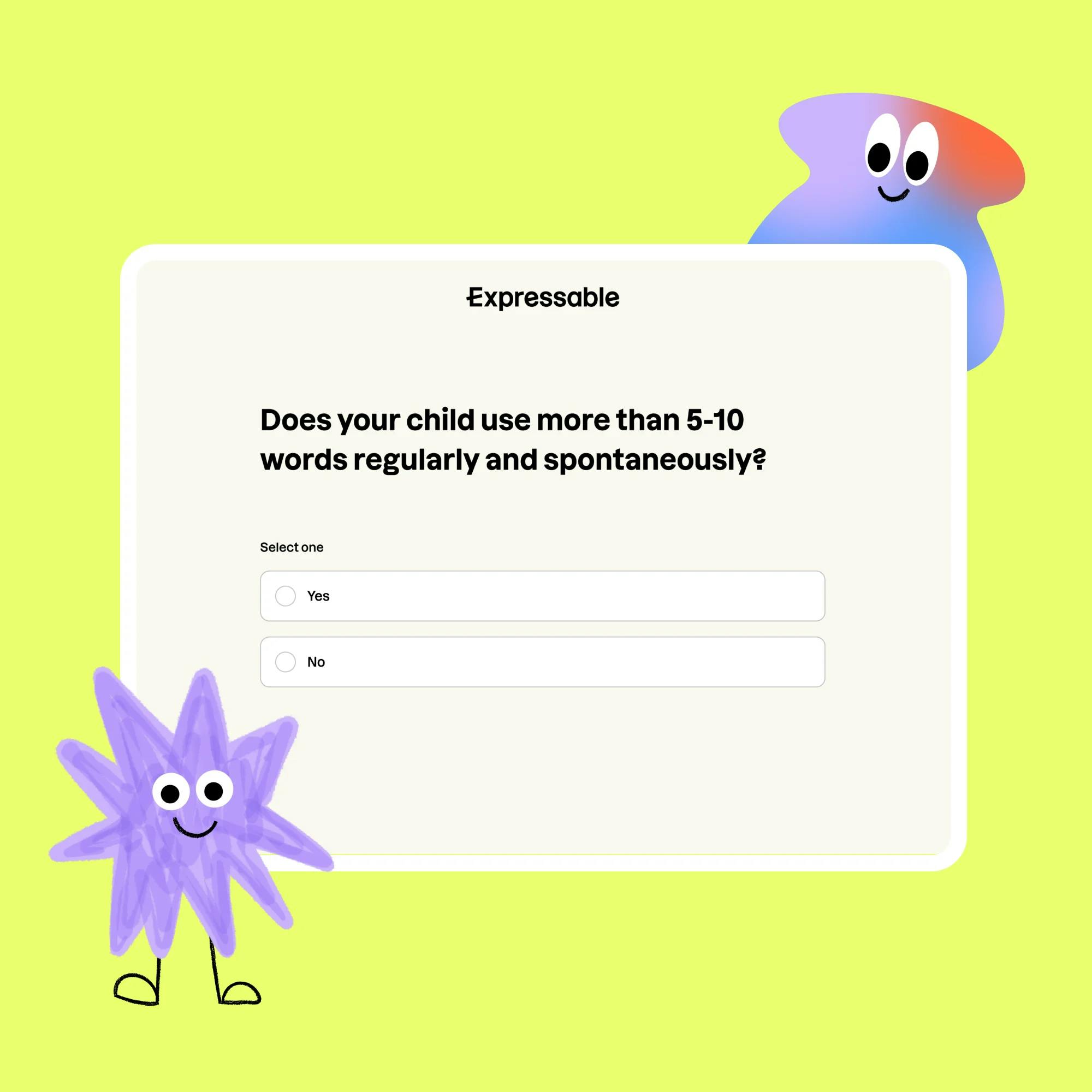All children progress on their own timeline. So it can be tricky to know whether your child is simply a late talker or if they need extra support. As a parent or caregiver, understanding the common causes of speech delay can help you decide when to seek help from a certified speech therapist.
In this article, we’ll explore the causes of speech delays, explain the differences between speech delay and autism, and reassure you that, in most cases, speech delays are not caused by parenting. We’ll also explain the importance of early intervention and how a speech therapist can guide both you and your child through this journey.
Could your child have a speech delay?
Take our screenerCommon causes of speech delays
If you’re worried about your child's speech development, it’s helpful to understand some of the underlying reasons delays can happen. Here are 6 common causes of speech delays:
1 Oral impairment
Some children have speech delays due to oral–motor problems. These occur when the brain has difficulty coordinating the movements of the lips, tongue, and jaw needed for speech. Children with oral–motor issues might also struggle with feeding or drooling.
2 Developmental speech and language disorder
Speech and language disorders can affect how a child processes and uses language. They may have trouble forming speech sounds, understanding what others are saying, or using words to communicate. Sometimes, these issues are linked to learning disabilities, making early detection especially important.
3 Hearing loss
Children learn to speak by hearing language around them. If a child can’t hear well or hears distorted sounds, it can make learning speech difficult. Hearing loss might be subtle — for example, a child may not respond to their name but react to visual cues. If you suspect hearing loss, a hearing test can provide answers.
4 Autism spectrum disorder
Many children with speech delays do not have autism. However, speech and language challenges can be an early sign of autism spectrum disorder (ASD). Children with autism may show less interest in social interaction, have difficulty with nonverbal communication, or have repetitive behaviors.


5 Lack of stimulation
Children learn language through interaction with other people. If a child isn’t exposed to enough spoken language or opportunities for engagement, their speech development might lag. Reading, singing, and talking to your child throughout the day can make a big difference.
6 Neurological problems
Conditions like cerebral palsy, muscular dystrophy, or a traumatic brain injury can affect the muscles needed for speech. In these cases, children often benefit from a team of specialists, including a speech-language pathologist (also known as a speech therapist), to support their communication development.


Speech delay vs. autism
A speech delay doesn’t automatically mean a child has autism. Let’s break down some key differences:
Social connection: Children with speech delays are often eager to connect with others. They enjoy hugs, seek attention, and respond positively to interaction. In contrast, autistic children may prefer to play alone or show more interest in objects than people.
Imitation and play: Children with speech delays tend to mimic actions and sounds. Autistic children might not imitate others as often.
Frustration vs. withdrawal: A child with a speech delay may get frustrated when not understood, while an autistic child might withdraw or lose interest rather than keep trying to communicate.
If you’d like to dive deeper into the communication signs of autism, check out this article.


Can parents cause speech delays?
It’s natural to wonder if something you did or didn’t do contributed to your child’s speech delay. The reassuring answer is no! Loving, attentive parents do not cause speech delays.
In rare cases, extreme neglect or trauma can impact speech development. However, in nurturing homes where children are cared for and engaged with, speech delays are more likely due to factors outside a parent’s control. If you’re curious about what you can do to support your child's speech development, this article offers helpful insights.
Find the right speech therapist for your child
We'll match you with a licensed speech therapist who's experienced in your child's needs and available when you are.
 Get started
Get startedWhen to seek speech therapy for a speech delay
If you’re concerned about your child’s speech or language development, trust your instincts. Talk to your pediatrician or reach out to a speech therapist directly. Speech therapists are trained to assess your child’s skills, identify causes of a speech delay, and create a personalized treatment plan to help them progress.
Early intervention is key. Research shows that children who start speech therapy early are more likely to catch up to their peers and gain confidence in their communication abilities.
How speech therapy supports your child – and you
Speech therapy for young children is often play-based. Play is a natural way for kids to learn, and therapists use toys, games, and activities to encourage speech and language development.
Therapy can happen in-person or online. Online speech therapy often makes it easier for caregivers to attend alongside their child and learn how to help them at home. Your speech therapist will teach you how to practice speech skills with your child during everyday routines like meals or playtime.
Your child’s progress doesn’t rest solely on therapy sessions — it flourishes through your involvement. Speech therapists give parents the tools, strategies, and encouragement to support their child’s communication growth every step of the way.
If you’re concerned about child's speech skills, click here to find a speech therapist. We're here to answer your questions and guide you on next steps. The earlier you seek help, the sooner your child can build the skills they need to communicate with the world around them.
By understanding the potential causes of speech delays and recognizing the signs, you’re already advocating for your child’s success. Every child deserves the opportunity to express themselves. With the right support, they can grow into confident, capable communicators.
How Expressable Can Help
Concerned your child isn't reaching age-expected milestones? Looking for communication support from a professional? Expressable is a national online speech therapy practice serving children and adults. We treat all major areas of communication and feeding, offer flexible hours including evenings and weekends, and accept most major health insurance plans. We’re proud to have earned more than 3,000 5-star reviews from our clients (4.9/5 average).
Our therapy model is centered on parent and caregiver involvement. Research proves that empowering caregivers to participate in their loved one’s therapy leads to better outcomes. That’s why we combine live, 1-on-1 speech therapy with personalized education and home practice activities for faster progress.
Communication is more than words. It’s how we share how we feel and show who we are. We’re here to help you or your child do just that.
 Leanne Sherred, M.S., CCC-SLP
Leanne Sherred, M.S., CCC-SLP













